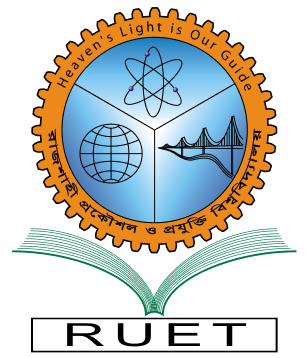Progress Report on SDG 4: Quality Education
Quality Education Initiatives at Rajshahi University of Engineering & Technology (RUET)
Rajshahi University of Engineering & Technology (RUET) actively contributes to achieving Sustainable Development Goal 4 (Quality Education) through its commitment to inclusive, equitable, and high-quality engineering education. By integrating outcome-based teaching, strong academic governance, faculty capacity-building, and student support initiatives, RUET ensures that learning remains accessible, relevant, and aligned with global standards. Its academic and research efforts continue to strengthen educational impact at the local, national, and international levels.
Academic Excellence and Inclusivity
- RUET offers 14 undergraduate programs, 15 postgraduate programs, and a range of Ph.D. opportunities across engineering, architecture, and science disciplines.
- The university currently hosts approximately 3,000 students and employs over 200 full-time faculty members, ensuring a favorable student-teacher ratio that supports individualized mentoring and research engagement.(ruet.ac.bd)
- Admission to RUET is conducted through a nationally standardized and merit-based admission test, ensuring equal opportunity regardless of gender, location, or economic background.
- RUET maintains an extensive system of scholarships and stipends, including government merit scholarships and residential hall grants, to support economically disadvantaged students.
Institutional Quality and Governance
- The Institutional Quality Assurance Cell (IQAC) was established in 2015 under the Higher Education Quality Enhancement Project (HEQEP). The IQAC monitors program accreditation, continuous quality improvement (CQI), and faculty development through training and self-assessment reports.(ruet.ac.bd)
- RUET regularly updates its curricula based on Outcome-Based Education (OBE) frameworks recommended by the University Grants Commission (UGC) and the Board of Accreditation for Engineering and Technical Education (BAETE).
- Departments such as Electrical and Computer Engineering (ECE) and Mechanical Engineering have already implemented full OBE structures, focusing on project-based learning and industry-linked research.(ece.ruet.ac.bd)
Research, Innovation, and Digital Learning
- RUET encourages interdisciplinary research and innovation through dedicated research funding and academic support. Faculty members have published numerous papers in international journals addressing sustainable engineering, renewable energy, and material science.
- The university library provides digital access to e-journals and academic repositories via UGC’s digital library consortium (BSDL), expanding resources for students and researchers.
- RUET’s introduction of Learning Management Systems (LMS) during and after the COVID-19 pandemic has allowed flexible blended learning and continuous academic engagement.
Infrastructure and Learning Environment
- The 152-acre campus offers a conducive academic environment, with state-of-the-art laboratories, modern classrooms, and a Central Library that houses over 90,000 printed and digital resources.(ruet.ac.bd)
- The university ensures a safe and inclusive learning space, with separate residential halls for male and female students, ensuring access to quality facilities for all.
- Regular co-curricular and skill-development activities (organized by the RUET Career Forum, Debating Club, Robotics Society, etc.) foster holistic education, communication skills, and leadership among students.
Impact and Future Directions
Through its commitment to educational quality, institutional transparency, and inclusivity, RUET continues to uphold the principles of SDG 4. Its sustained emphasis on faculty training, student well-being, and outcome-based pedagogy ensures a learning environment that produces socially responsible engineers and innovators.
Future goals include:
- Expanding international collaboration and exchange programs to enhance global learning exposure.
- Strengthening research capacity through industry-academia partnerships.
- Establishing a Teaching and Learning Innovation Center (TLIC) for continuous faculty pedagogical development.
- Promoting community-based education initiatives to extend engineering knowledge for local and regional development.
